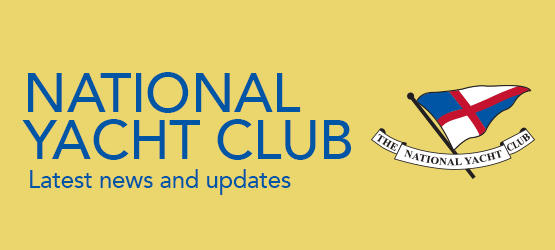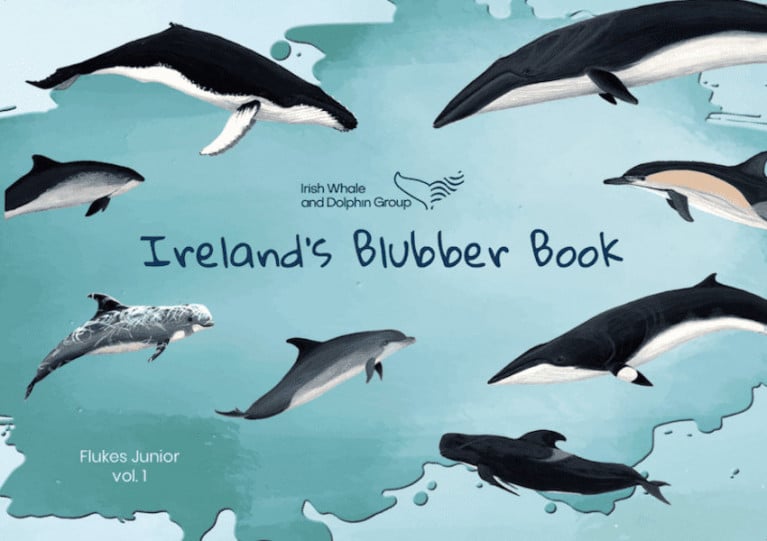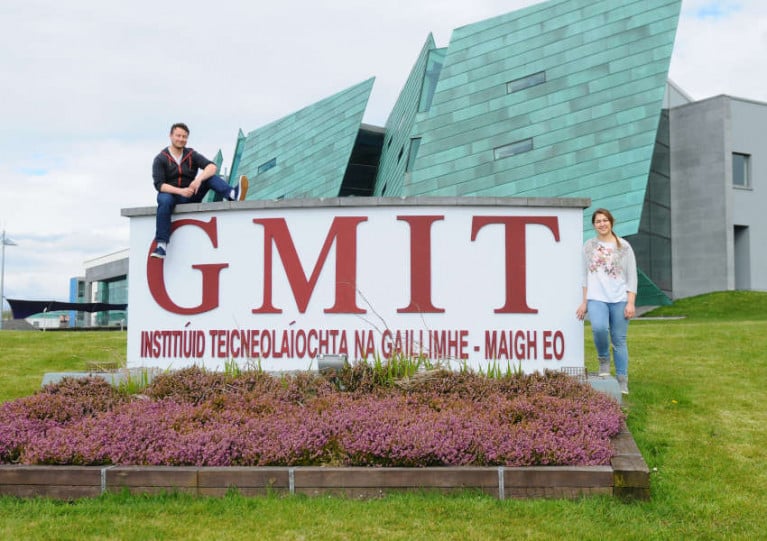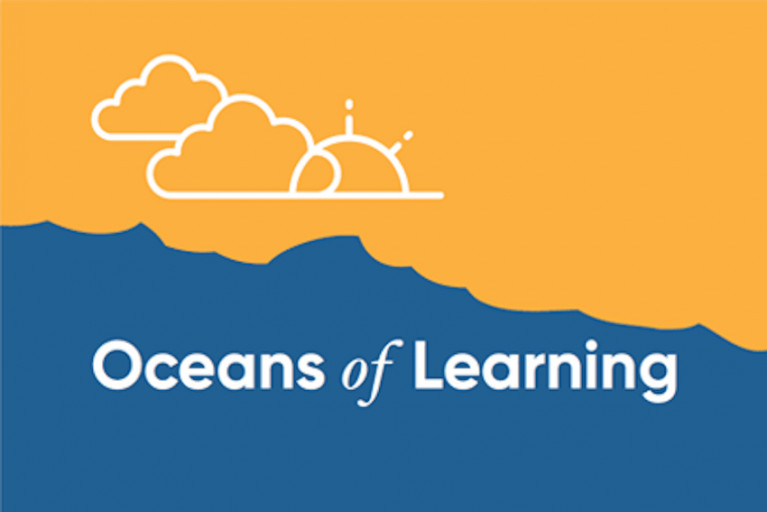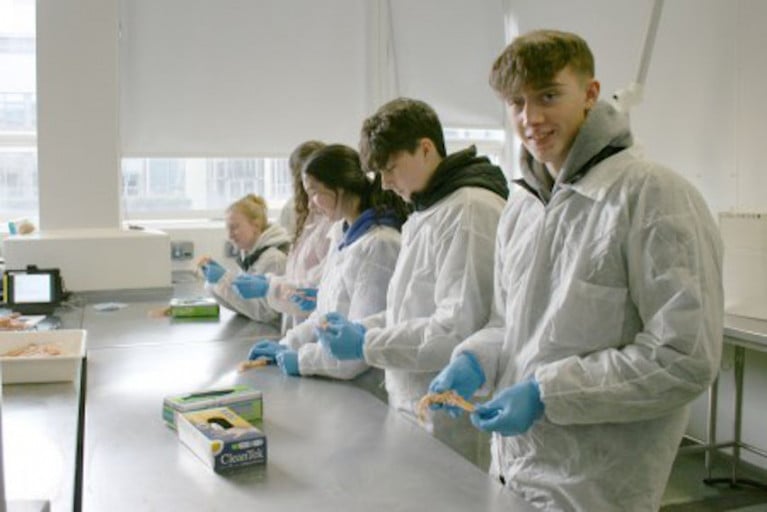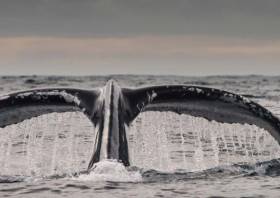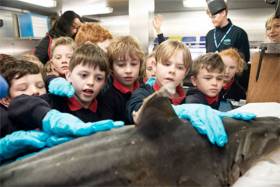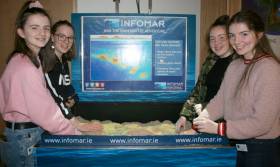Displaying items by tag: education
Loughs Agency Education Team Delivers Programmes at Schools Across Foyle and Carlingford Catchments
Over the last few weeks, the Loughs Agency’s education team have been busy informing and educating pupils and teachers within the Foyle and Carlingford catchment areas about our waterways.
Education officer Michael Cosgrove made several visits to St Mary’s College in Derry to help Year 11 and 12 students with some practical water-quality assessments, using samples from both strong and weak water-quality sites as a comparison exercise.
Michael talked about the history of the Loughs Agency as well as the work the agency does across the Foyle and Carlingford Catchments, before finally delivering a presentation on the science of water.
The workshops delivered by Michael helped the students complete their Science BTEC and afterwards the school showed their appreciation by sending a thank-you card.
Michael also visited Eglinton Community Pre-School to deliver a marine show-and-tell. He talked to the children about ocean literacy and marine biodiversity, before giving them a chance to look at different shells, seaweeds and marine objects.
Michael also brought along some of the Loughs Agency’s inflatable marine wildlife, which proved to be the star of the show!
Michael and fellow education officer Jack Porter visited Year 8 pupils at Castlederg High School in Co Tyrone to deliver a lesson on the science of water as part of their “Living Things” day.
 Pupils at Castlederg High School got the chance to have a closer look at the macroinvertebrates that live within their local river
Pupils at Castlederg High School got the chance to have a closer look at the macroinvertebrates that live within their local river
With one session in the morning and another in the afternoon, Michael and Jack engaged with 80 first-year students, offering them an introduction to the agency and teaching them about the important work it does in and around the local rivers. This was followed by a presentation which allowed the children to better understand the hydrological cycle and the biodiversity within our rivers.
A sample of river water was brought into the classroom as the pupils got the chance to have a closer look at the macroinvertebrates that live within the river. The education team divided these samples into separate trays and distributed these across the classroom. The pupils were then tasked with identifying the different invertebrates using ID sheets, with cased caddisflies being the clear favourite.
To conclude the day, pupils got the chance to use the salmon life cycle board game which is both fun and educational.
At Omagh County Primary School, Jack Porter and fishery officer Richard Farrow delivered a presentation on the role of the agency and the importance of water quality. They then split the 40 Primary 3 pupils into separate groups and asked them to identify the macroinvertebrates in their tray. This was followed by a talk from Richard on the importance of protecting and caring for our local waterways.
Jack Porter also delivered “Science of Water” workshops to six schools in Co Donegal — Dromore National School in Killygordon; Cloughfin National School in Lifford; St Baithin’s NS in St Johnston; Scoil Cholmcille in Greencastle; St Eunan’s NS, Raphoe; and Glencovitt NS in Ballybofey — that had completed the Something Fishy project which taught pupils across the River Finn catchment about their local waterways, aiming to heighten awareness of the agency’s role within conservation and protection, as well providing teachers the tools to educate children on the lifecycle of the salmon.
Jack returned to St Baithin’s to deliver a workshop to the Senior Infants and First Class pupils on the science of water. Afterwards the pupils engaged with some local macroinvertebrates, were taught the importance of protecting rivers and learned all about the various lives that exist within their local streams and waterways.
The children found the workshop very engaging, asking excellent questions and showing a desire to learn more about the local environment, the Loughs Agency says.
The Loughs Agency and pupils from Moville Community College in Co Donegal have been exploring the freshwater and marine environments of the Foyle catchment as part of the Foyle Ambassadors Programme.
The five-day Ambassador programme provides a fantastic opportunity for pupils to learn about their local environment outside the classroom through hands-on participative experiences.
One field trip focused on freshwater ecosystems. The ambassadors learned how to collect and identify various mini-beasts found in local rivers, completing a citizen survey to help indicate the river's overall water quality.
Environmental education and outreach officer Aoibheann Gillespie-Mules said: “We had discussions about rivers, highlighting the habitats in which the fish live, the food they eat, the natural threats they face and the impact of human activities and waste on their health and survival.
“It is important for young people to be aware of these local issues and their role in protecting local habitats.”
The ambassadors also explored the intertidal zone of Culdaff Beach. Pupils were amazed to discover a variety of marine life under seaweeds and rocks — from shore crabs and mussels to common prawns, barnacles, limpets and anemones.
 Pupils at Moville pupils get a classroom briefing | Credit: Loughs Agency
Pupils at Moville pupils get a classroom briefing | Credit: Loughs Agency
Ambassadors learned how to identify many marine critters and, most importantly, gently and safely handle and minimise disturbances, always leaving seaweeds and rocks as they were found.
Gillespie-Mules added: “We discussed the importance of our ocean, blue carbon ecosystems and involvement in citizen science projects.
“It was great to see the young people leading a coastal clean-up, collecting litter whilst recording what they found. The Ambassadors gathered over 250 items, including a large rope covered in goose barnacles.”
To end the day, the Foyle Ambassadors got to showcase their creative sides through the designing of marine beach art.
Ambassadors have also received coaching from professional angling guides at a local fishery. For many, it was their first fishing experience, and a few were able catch and release fish for the first time.
Each ambassador received a Loughs Agency rod licence as part of the programme and can continue to fish for the rest of the season.
The Ambassador experience enables pupils to gain the John Muir Discovery Award and complements their learning in subjects such as geography and science. This experience will also plant many seeds for future decision-making regarding protecting and conserving our natural world, the Loughs Agency says.
The Loughs Agency’s Education Team were recently invited to Drumahoe Primary School in Derry to facilitate a freshwater habitat study of the River Faughan.
Over 50 Year Seven pupils participated in the activity against the backdrop of the historic Drumahoe Bridge.
The session started with an introduction to Loughs Agency and what the organisation does across the Foyle and Carlingford catchments in Ireland and Northern Ireland.
The young pupils were challenged with several river study tasks, including assessing the weather (particularly precipitation), river width and depth, riverbed type and surrounding land use, as well as a litter survey and litter pick.
A highlight of the trip was discovering the macroinvertebrates found in the river after pupils collected bug samples.
Education engagement officer Jack Porter explained: “Through this activity, pupils learned that each river bug, or macroinvertebrate, is an indicator of how healthy or polluted the water is. The activity developed their understanding of the importance of water quality and the role of macroinvertebrates within the river’s ecosystem.”
To conclude the trip, pupils participated in bird and fish identification, further expanding their impressive knowledge of the wildlife in and around their nearby rivers.
The Drumahoe pupils left with a greater understanding of the local environment and a new role as citizen scientists. Some even showed an interest in becoming freshwater scientists in the future.
The Loughs Agency’s Education Team are keen to work with primary and post-primary schools within the Foyle and Carlingford catchments. Get in touch by emailing [email protected] for more information.
‘Ireland’s Blubber Book’ — A New Educational Resource for Young & Aspiring Marine Biologists
The Irish Whale and Dolphin Group (IWDG) has announced a new educational resource for young and aspiring marine science experts.
Ireland’s Blubber Book: Flukes Junior Vol 1 is a comprehensive workbook on cetaceans – the marine wildlife family comprising whales, dolphins and porpoise – found in Irish waters for primary school children aged between 9-12.
The new resource was created to support support the aims of the National Strategy on Education for Sustainable Development by IWDG education and outreach officer Sibéal Regan and illustrated by the talented John Joyce and Jim Wilson.
“We believe that the first step in becoming an ocean literate and informed society, starts with our youngest citizens,” the IWDG says in its introduction to the resource.
It adds that the workbook “will motivate and empower them throughout their lives to become informed active citizens, who take action for a more sustainable blue future”.
Teachers can use Ireland’s Blubber Book in a classroom setting, by going through the content and worksheets themselves.
But the IWDG is also offering to facilitate virtual workshops “making the experience even more interactive and engaging”.
Interested schools can contact Sibéal Regan at [email protected] to enquire about using this new book in their classroom.
It will also be available from the IWDG shop and will have its official launch online on the IWDG Facebook page next Thursday 28 January at 11am.
SmartBay Ireland Announces New Scholarship For Research With GMIT
SmartBay Ireland have collaborated with the Galway-Mayo Institute of Technology (GMIT) to launch a new scholarship scheme for a candidate from the Connemara Gaeltacht to begin a Master’s research programme.
Commencing in November 2020, the new programme aims to develop post-primary educational resources in the field of marine renewable energy.
And the scholarship, which is now open for applications, is designed to fund and support a candidate in the Connemara Gaeltacht Region — while also driving awareness around ocean literacy, marine renewable energy, and sustainability through education in local schools.
The successful candidate will receive full funding support to the value of €44,500 over the duration of the 24-month project, which will focus on the preparation and delivery of educational resources at post-primary level, in both English and Irish.
SmartBay Ireland general manager John Breslin said: “This scholarship is an excellent opportunity for the successful candidate not only to advance in their career, but to be at the forefront of developing educational resources and make a positive and lasting impact on the post primary curriculum.”
Applications are open until noon next Wednesday 16 September for candidates with experience as a post-primary educator, preferably in the field of science, with demonstrable proficiency and fluency in the Irish language.
“This is a very exciting opportunity which would suit an enthusiastic candidate with a passion for education, the marine and sustainability,” said Dr Róisín Nash, a lecturer at GMIT.
“At a time when research and management of essential marine resources are key features of a sustainable future, this is a unique project with lots of opportunities for the candidate to be creative and influential in incorporating marine and renewable energy into the classroom.”
The SmartBay Ireland Postgraduate Research Scholarship is funded by the Galway-Mayo Institute of Technology, the Marine Institute, the Sustainable Energy Authority of Ireland and Údarás na Gaeltachta.
Full details on the postgraduate research scholarship and application procedure are available from GMIT website HERE.
Dive Deep Into ‘Oceans Of Learning’ Online Resources
Dive deep into the oceans of learning resources available on the Marine Institute’s website via the Oceans of Learning series, which offers downloadable resources, videos and interactive activities exploring our marine resource and marine scientists’ vital work.
As the institute’s new chief executive insists on Tom MacSweeney’s latest podcast, it is essential to have good public understanding of the importance of the sea.
That’s never been easier today, as students of all ages can go online and discover, for instance, the importance of Ireland’s marine research vessels — the RV Celtic Explorer and RV Celtic Voyager — and jump on board the former for a 3D virtual tour.
Elsewhere, you can navigate a range of marine topics through the awareness campaign Exploring Our Marine, and learn about weather buoys, phytoplankton, deep-sea species and Ireland’s ocean economy.
And discover more about our oceans through a colourful series of marine facts, on everything from shipping and seafood to sharks and shipwrecks.
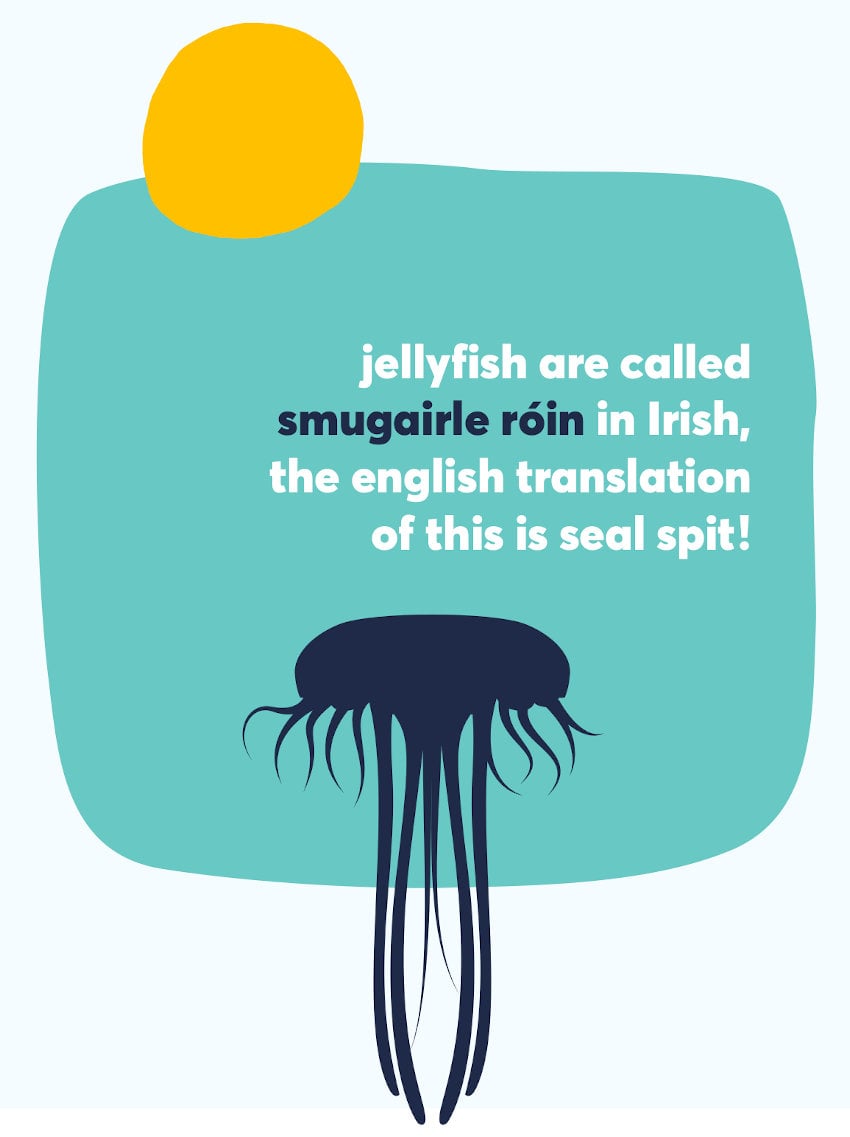
The Marine Institute’s Explorers Education Programme also offers lesson plans about the ocean for teachers, parents and primary school children to use while schooling from home.
Other educational initiatives supported by the Marine Institute include the documentary series Ireland’s Deep Atlantic.
The well-received series features in online classroom resources for Junior Cycle students and explores sustainable development, impact on the environment, the Real Map of Ireland and the importance of our ocean territory. Lesson plans and video clips from the documentary are available from the RTÉ Learn website.
Other online learning programmes recently highlighted on Afloat.ie include the Irish Whale and Dolphin Group’s Flukey Friday, and the Irish National Sailing & Powerboat School’s Sailing School from Home.
Twenty-five Transition Year (TY) students from Mayo, Galway, Roscommon, Clare, Kildare, Carlingford, Dublin and Sligo were welcomed to the Marine Institute’s sixth annual TY week programme following the recent midterm break.
From 24-28 February, students had the opportunity to learn about marine science, technology, engineering and communication through a range of activities at the Marine Institute's headquarters in Oranmore, Co Galway.
Students participated in interactive activities related to marine fisheries and chemical science, seabed mapping, food safety, communications, research vessel operations, oceanography, climate change, engineering technology, maritime development, information technology with data and coding as well as team-building.
The TY programme enables students to shadow scientists and staff at the Marine Institute and experience what it is like to work in the marine sector.
Marine Institute chief executive Dr Paul Connolly said: “Our TY programme provides an insight into the diverse career opportunities on offer in Ireland’s marine sector, and inspire the next generation of marine professionals and ocean leaders.
“Increasing students’ knowledge and engagement on the importance of our marine resource is key to supporting Ireland’s ocean economy, where highly-skilled professionals are needed in the future.”
HR manager Catherine Quigley-Johnston added: “The demand for our TY programme is growing every year and it is great to see such a strong interest in science, technology and the environment and that many are considering pursuing careers in our marine and maritime sectors at this stage of their education.
“Alongside the interest and enthusiasm from our students, the passion and knowledge shared by our teams involved in delivering the content helps make the TY programme a success."
Encouraging a new generation to pursue marine and maritime careers is part of the Marine Institute’s Strategic Plan 2018-2022: Building Ocean Knowledge, Delivering Ocean Services.
Ireland's national marine plan, Harnessing Our Ocean Wealth, also highlights the need for education and training programmes to maintain and develop skilled professionals in the marine sector.
All places for this year’s TY programme have been allocated, but next year’s Transition Year students, from any school in Ireland, are welcome to apply for the week-long, full-time programme at the Marine Institute for 2021 when the process begins in September.
New Online Resources Bring ‘Ireland’s Deep Atlantic’ Into The Classroom
TV documentary Ireland’s Deep Atlantic will feature in new online classroom resources for Junior Cert students, it has been announced.
Ireland’s Deep Atlantic — produced by Sea Fever Productions and supported by the Marine Institute, BAI and the Environmental Protection Agency — sees filmmaker Ken O'Sullivan embark on a series of voyages in the North Atlantic in search of blue whales, sharks and deep-water coral reefs.
O’Sullivan filmed part of the series on board the Marine Institute’s research vessel the RV Celtic Explorer and documented coral reefs at a depth of 3,000 metres using the ROV Holland 1.
The series joins two other Irish-produced and publicly funded TV programmes used to create the new online classroom resources.
Business Studies students will use the series, including video clips of the RV Celtic Explorer and scientists, to learn about consumer behaviour and sustainable development, and the impact of economic growth on society and the environment.
Geography students, meanwhile, will learn about the ‘Real Map of Ireland’ and the importance of Ireland's ocean territory. The students will also learn about the exploitation of water, fish stocks, forestry, and soil and the relationships between the physical world, tourism and transport.
Ken O’Sullivan welcomed the new resources, saying: “It’s just wonderful now to realise that every teenager in Ireland will see our beautiful, fertile oceans and learn not just about the rich life within them, but the impact of human behaviour on our oceans with things like consumer spending habits, marine plastics and also the value of eco-tourism to coastal communities.
“Ireland’s Deep Atlantic is the first documentary to be used in this way and the platform has now been built for RTÉ to host many more publicly funded documentaries in this way for the secondary school education curriculum.”
Teachers and students can access the educational material and the programme clips referenced from the RTÉ Learn website.
Children from Rang 2 at Scoil Shéamais Naofa in Bearna got up close and personal with sharks on the RV Celtic Explorer as part of the Marine Institute’s outreach and engagement programme.
The pupils completed a project module on sharks in Irish waters as part of the Marine Institute’s Explorers Education Programme, and also had the opportunity to visit the State research vessel.
Outreach officer Padraic Creedon of the Explorers Education Programme said one if the programme’s unique elements “is the content and support provided to teachers in the classroom in an easy and fun way.
“The students were inspired by the discovery of a rare shark nursery 200 miles off the west coast of Ireland in 2018, and we were delighted to create lessons, interactive experiments and discussion about the ocean, sharks and their environment for the class.”
While on board the RV Celtic Explorer, pupils met with the captain and scientists and saw what it might be like to work on a research vessel.
Students spoke with Captain Denis Ronan about the Celtic Explorer, and learn more about the acoustically silent ship that can stay out at sea for up to 35 days.
The pupils were excited to tour the vessel and speak with marine scientists to discover more about shark species, seabed mapping, shipwrecks and the marine environment.
Visiting the dry and wet labs, the pupils saw various fish species from recent surveys and shark species, such as dogfish and the tope shark.
Clár Ní Bhraonáin, teacher at Scoil Shéamais Naofa, said: “It has been an amazing experience … Students don’t forget days like this.”
The Explorers programme offers a range of materials including lesson plans to conduct experiments in class, watching films that helps generate discussion, and peer learning among pupils.
“Because of the students’ enthusiasm to learn more about sharks, we have been able to incorporate marine themes across the curriculum, where they have excelled and produced some incredible work, from writing books about sharks to a series of posters and artwork,” Ní Bhraonáin added.
“This project has really helped myself and the students learn more about the ocean.”
For more information on the Explorers Education outreach centres, visit the Explorers Contacts page at Explorers.ie. The programme is supported by the Marine Institute and is funded under the Marine Research Programme by the Government.
TY Students Dive Into Science At Marine Institute’s HQ
Last week the Marine Institute’s headquarters in Oranmore, Co Galway welcomed 22 Transition year students to its fifth annual TY training week.
Students from Galway, Mayo, Clare, Roscommon, Dublin and Waterford engaged in a range of STEM-related activities to experience what it is like to work in the marine sector.
The TY students shadowed scientists and staff at the Marine Institute, learning about marine science, technology and asasociated disciplines.
They also engaged in a range of presentations and interactive activities related to fisheries science, marine chemistry, seabed mapping, food safety, research vessel operations, maritime development, oceanography and marine climate, data, applications development, team-building and communications.
“Increasing students’ knowledge on the importance of our marine resource, is key to supporting Ireland's ocean economy, where highly skilled professionals are needed in the future,” said Marine Institute chief executive Dr Peter Heffernan.
“Our TY Week programme aims to inspire a new generation of marine professionals, and provides an insight into the diverse career opportunities on offer in Ireland’s marine sector.”
TY students from any school in Ireland are welcome to apply for this week-long, full-time work experience opportunity at the Marine Institute for 2020. Further details on the application process will be available later this year.



























